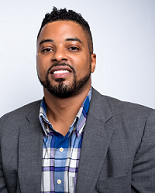 On Kendall’s first day with AT&T, smartphones were still new. Kendall was one of six recent hires on a technical support team that focused mainly on TV, Internet and U-Verse. To him, and to many others, AT&T was known as a phone company.
On Kendall’s first day with AT&T, smartphones were still new. Kendall was one of six recent hires on a technical support team that focused mainly on TV, Internet and U-Verse. To him, and to many others, AT&T was known as a phone company.
That was 2007.
As Kendall’s familiarity with AT&T grew over the years, so too did his opportunities and the need to tackle them. From technical support, he was introduced to other positions within similar fields: support as a team lead and later taking on a new role in case management. The work was good, but he knew there was something more beyond the horizon.
Unknown to him, compliance and security was always something he was connected to.
One of my best friends, who is a Senior Chief in the Navy, told me, ‘You’ve always been some kind of compliance person. You’ve always been an engineer. It’s always been in you, and you just didn’t really know it.’ That really got me thinking.
Later he recalls going through files and finding a certification in cybersecurity and a CCNT in IP Networking that he had completely forgotten about.
Skills Through Mentorship
In 2014, Kendall joined The NETwork – the African American Employee Resource Group at AT&T, and the oldest in the company. He wanted to take advantage of the professional development programs the group had to offer. He wanted to increase his professional skills, learn the business, and learn how to be effective and stand out in the company. So much of his growth sparked from the support of the people he met. He met other teammates with similar backgrounds, who helped guide him and build connections that lead to a better understanding of the corporate environment and career development.
If it wasn’t for mentorship, I would probably be in the same place as when I started. They helped me understand the value of going all the way.
With insights from his mentors, Kendall began his journey in preparing for a future in STEM. He returned to school, with help from AT&T, to earn his Master of Science degree in Information Technology. All the while picking up various topics through Future Ready training and other available training from AT&T’s Technical University (TU). He even moved to Atlanta, Georgia from Wisconsin to enroll in the Technology Development Program.
Building the Network
Once you’re out of high school, things change. There are no leadership courses that help prepare you for networking. I had to really adjust to that. The NETwork helped me put myself out there.
With Kendall’s desire for continued growth, he knew networking was a key part. He attended as many national events and leadership conferences as he could. He was able to attend many of them through his involvement with The NETwork. However, since he wasn’t quite yet in management, some conferences he would take his personal vacation days. There, he made further connections, meeting with executive leaders in person and other key people who would help him later in his career.
“I was at a conference in Dallas and remember thinking, ‘Wow, this is what AT&T really looks like. This is way different than being in a call center.’ Almost every person I approached took the time to talk for five minutes. That’s the benefit of being in a company with an inclusive atmosphere. Not even the higher-ups like VPs will reject you. One VP thought it was bold that I approached him! He said a lot of people just don’t do that sort of thing.”
What’s Next
Fast forward almost 15 years from that first day in a call center in Wisconsin, Kendall is still moving forward. He now helps lead as one of our Senior Technology Security team members for Network Engineering and Operations. Kendall considers himself a protector in and out of the office.
“The transition from protecting customers when I stated to now protecting the entire company has been really cool.”
Kendall keeps track of his development and checks in on his progress with mentors. He continues learning new skills and taking part in events through his membership with the NETwork and the larger AT&T community. He is currently studying for his CISSP (Certified Information Systems Security Professional) Certification, what he calls “the mother of all cybersecurity certifications.”
A driving force that has stuck with him, and will continue to do so, is something one of his mentors repeats to him on a regular basis, “Always try to advance yourself by learning something different and new. Don’t get stagnate or stale where you’re at. Don’t be scared to move forward.”



